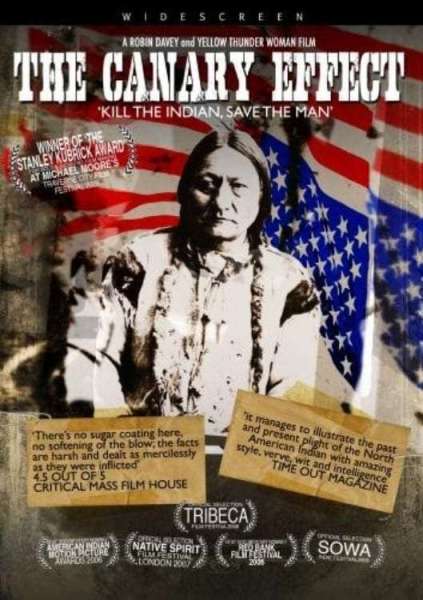The Canary Effect est un film américain de genre Documentaire
The Canary Effect (2006)

Si vous aimez ce film, faites-le savoir !
OrigineEtats-Unis
Genres Documentaire
Themes Documentaire sur le droit, Documentaire sur une personnalité, Documentaire sur la politique, Politique
Note79%










The Canary Effect is a 2006 documentary that looks into the effects of that the United States and its policies have on the Indigenous peoples (Native Americans) who are residents. It premiered at the Tribeca Film Festival and won the Stanley Kubrick Award at the 2006 Traverse City Film Festival (Michael Moore hosts).
The movie was directed by Robin Davey and Yellow Thunder Woman, who are both members of LA Based alternative pop group The Bastard Fairies. The documentary was released on DVD in 2008.
Commentaires
Postez un commentaire :
Suggestions de films similaires à The Canary Effect
Il y a 8965 ayant les mêmes genres cinématographiques, 9996 films qui ont les mêmes thèmes (dont 187 films qui ont les mêmes 4 thèmes que The Canary Effect), pour avoir au final 70 suggestions de films similaires.Si vous avez aimé The Canary Effect, vous aimerez sûrement les films similaires suivants :

All Hell Broke Loose (1995)
, 45minutesOrigine Israel
Genres Documentaire
Thèmes Afrique post-coloniale, Religion, Le terrorisme, Documentaire sur le droit, Documentaire sur la guerre, Documentaire historique, Documentaire sur une personnalité, Documentaire sur la politique, Documentaire sur la religion, Documentaire sur le terrorisme, Politique, Religion juive
 , 1h15
, 1h15Genres Documentaire
Thèmes Afrique post-coloniale, Religion, Documentaire sur le droit, Documentaire sur la guerre, Documentaire historique, Documentaire sur une personnalité, Documentaire sur la politique, Documentaire sur la religion, Politique, Religion juive
Acteurs Nicholas Blincoe
Note69%






Unsettled (2007)
, 1h20Genres Documentaire
Thèmes Afrique post-coloniale, Religion, Documentaire sur le droit, Documentaire sur la guerre, Documentaire historique, Documentaire sur une personnalité, Documentaire sur la politique, Documentaire sur la religion, Politique, Religion juive
Note73%






Confrontation at Concordia (2003)
Origine Canada
Genres Documentaire
Thèmes Afrique post-coloniale, Religion, Documentaire sur le droit, Documentaire sur la guerre, Documentaire historique, Documentaire sur une personnalité, Documentaire sur la politique, Documentaire sur la religion, Documentaire sur les villes, Politique, Religion juive
The documentary opens with scenes of the violence at the event, depicting fighting between protesters and Jewish students attempting to enter the venue. This is followed by an interview with student Samir Elitrosh, a leader of the Solidarity for Palestinian Human Rights and the leader of anti-Israel violence who was later suspended. It also features interviews with Concordia's Hillel president Yoni Petel and Concordia rector Frederick Lowy, and concludes with a discussion of what it sees as the growing trend of anti-Israel activities on North American campuses.
 , 1h10
, 1h10Origine Canada
Genres Documentaire
Thèmes Afrique post-coloniale, Documentaire sur le droit, Documentaire sur la guerre, Documentaire historique, Documentaire sur une personnalité, Documentaire sur la politique, Politique
Nadine Bari nous emmène sur une route en Guinée à la recherche de son mari guinéen. En chemin elle nous raconte sa longue bataille auprès des autorités politiques pour découvrir la vérité sur la disparition de son mari. Parsemée de grands espoirs et de profonds désespoirs, son histoire ressemble à celle de milliers de femmes qui cherchent encore aujourd’hui la vérité sur le sort de leur mari, père, frère et fils disparus lors de la dictature de Sékou Touré.

Checkpoint (2003)
, 1h20Origine Israel
Genres Documentaire
Thèmes Afrique post-coloniale, Religion, Documentaire sur le droit, Documentaire sur la guerre, Documentaire historique, Documentaire sur une personnalité, Documentaire sur la politique, Documentaire sur la religion, Politique, Religion juive
Note77%





Checkpoint is shot in cinéma vérité style with no narration and very little context. Shamir himself is absent from the film except for one scene in which a border guard asks him to try to make him "look good," and Shamir asks how he should do that.

Aviv (2003)
, 1h20Origine Israel
Genres Documentaire
Thèmes La musique, Religion, Documentaire sur le droit, Documentaire sur la guerre, Documentaire historique, Documentaire sur la musique, Documentaire sur une personnalité, Documentaire sur la politique, Musique, Politique, Religion juive
Acteurs Shira Geffen
Note66%






Nos lieux interdits (2009)
, 1h45Réalisé par Leïla Kilani
Origine France
Genres Documentaire
Thèmes Afrique post-coloniale, La famille, Documentaire sur le droit, Documentaire sur la guerre, Documentaire historique, Documentaire sur une personnalité, Documentaire sur la politique, Politique
Note64%





En 2004, cinq ans après son intronisation, le roi du Maroc Mohammed VI met en place une Commission pour l’équité et la réconciliation pour enquêter sur la violence d’État durant les années de plomb, sous le règne de son père Hassan II. Le film accompagne durant trois ans quatre familles dans leur quête de la vérité : militant, jeune rebelle militaire ou simple citoyenne, eux-mêmes ou les membres de leur famille ont été emprisonnés dans différents lieux disséminés sur l’ensemble du territoire marocain. Chaque personnage tente de « savoir », de donner du « sens », de faire le deuil. Mais quarante ans plus tard, le secret d’État finit par dévoiler l’existence d’un autre secret, plus intime, le secret de famille. Chacun éprouve alors la nécessité de reconstruire cette histoire et de retrouver les Pères, doublement enlevés par la disparition et par le secret.

Origine Etats-Unis
Genres Documentaire
Thèmes Afrique post-coloniale, Le racisme, Documentaire sur la discrimination, Documentaire sur le droit, Documentaire sur une personnalité, Documentaire sur la politique, Politique
In the 1950s South Africans realized that their freedom struggle had to be built in four arenas of action: mass action, underground organization, armed struggle, and international mobilization. Have You Heard From Johannesburg takes viewers inside that last arena, the movement to mobilize worldwide citizen action to isolate the apartheid regime. Inspired by the courage and suffering of South Africa’s people as they fought back against the violence and oppression of racism, foreign solidarity groups, in cooperation with exiled South Africans, took up the anti-apartheid cause. Working against heavy odds, in a climate of apathy or even support for the governments of Hendrik Verwoerd, John Vorster and P.W. Botha, campaigners challenged their governments and powerful corporations in the West to face up to the immorality of their collaboration with apartheid.
 Connexion
Connexion